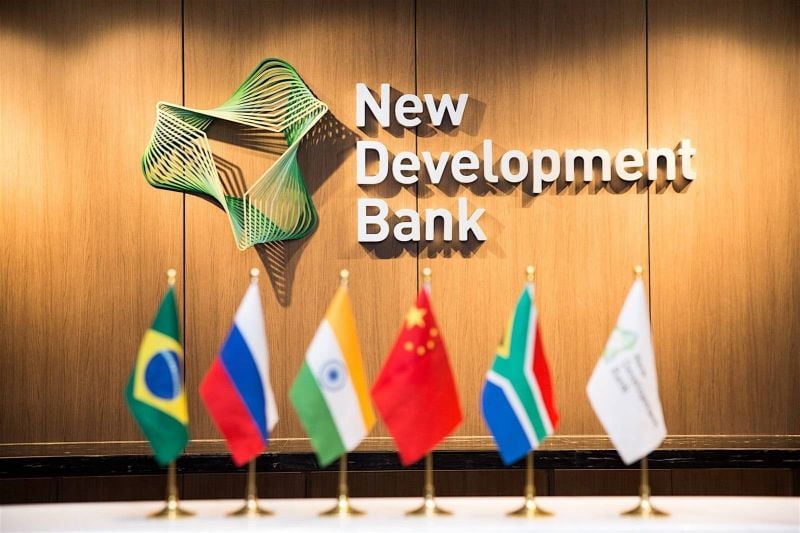
The New Development Bank logo. (Credit: Wikimedia)
Riyadh is engaged in negotiations to join the Shanghai-based New Development Bank (NDB), also known as BRICS Bank, the Financial Times has revealed.
Created by a group of five counties — Brazil, Russia, India, China and South Africa — in 2014, the institution presents itself as an alternative to the US-dominated World Bank and International Monetary Fund (IMF).
It also aims to move the global economy away from the dollar’s dominance, by offering loans in local currencies to countries in the Global South.
“In the Middle East, we attach great importance to the Kingdom of Saudi Arabia and are currently engaged in a qualified dialogue with them,” the New Development Bank told the financial daily in a statement three days ahead of the bank’s annual meeting.
The oil-rich monarchy has already expressed its willingness to join the BRICS, as have the United Arab Emirates, which did in 2021, Egypt, which became a member of in February, Bahrain and Indonesia. Iran, Argentina and Algeria have also submitted applications for membership.
China takes center stage
The announcement comes as Saudi Arabia continues to diversify its economic and strategic partnerships with actors around the world, including China, which holds a central spot.
Following Xi Jinping’s visit to Riyadh in December 2022, the kingdom signed a Beijing-brokered historic détente agreement with Iran under Chinese auspices in March.
Speaking to the Chinese state media outlet CGTN on April 14, Dilma Rousseff, NDB’s new chairperson, promised 30 percent of loans in local currencies for the 2022-2026 period.
“It is necessary to find ways to avoid risks associated with the exchange rate and other problems such as dependence on a single currency, like the US dollar,” said Brazil’s former president.
“The good news is that we are seeing many countries choosing to trade using their own currencies,” she added. “China and Brazil, for example, agree to trade with the renminbi and the Brazilian Real,” she said.
‘Swap deal’
China, which imports a quarter of Saud Arabia’s oil exports, has already expressed its desire to buy crude oil in renminbi.
On the sidelines of the World Economic Forum earlier this year, Saudi Finance Minister, Mohammed al-Jadaan, said he is open to this idea, but the announcement was not followed by any action.
Riyadh is in fact dependent on the US monetary system. As the Saudi riyal is pegged to the dollar, the decision to export oil in another currency could signal to the markets the greenback’s instability. In the event of a depreciation in the value of the US dollar, the Saudi currency would be affected.
Robert Mogielnicki, a scholar specializing in the Gulf-China relations at the Arab Gulf States Institute in Washington, anticipated that some Gulf countries, such as Saudi Arabia would “imply that they’re considering moving in that direction and make gestures to appease” China.
But they’d have to “tread very carefully about initiating actions that could have a negative impact on the value of the dollar,” he added. The Chinese and Saudi central banks could, for example, exchange currencies of up to a few hundred million or a billion dollars to enable their companies to trade more easily using their own currencies, the researcher added.
The “swap deal” for 35 billion yuan that China signed with the United Arab Emirates over three years in 2012, was renewed in 2015.
Sanctions against Russia
The possibility of Saudi Arabia joining the NDB looms, though the institution’s financing options have been undermined by Western sanctions against Russia.
As a founding member, Moscow holds a stake of around 19 percent in the NBD. Yet the bank was forced to freeze its Russian exposure, estimated at $1.7 billion, and to halt all new projects in the country to reassure investors.
“We are struggling to mobilize resources,” Ashwani Muthoo, director general of NDB’s evaluation office, told the Financial Times.
For its part, Saudi Arabia benefited from soaring oil prices in 2022, and became the fastest-growing among the G20 countries with 8.7 percent of economic growth. Should its membership be confirmed, it would be all the more reassuring for the NDB’s financing prospects.
This article was originally published in French in L'Orient-Le Jour. Translation by Joelle El Khoury.